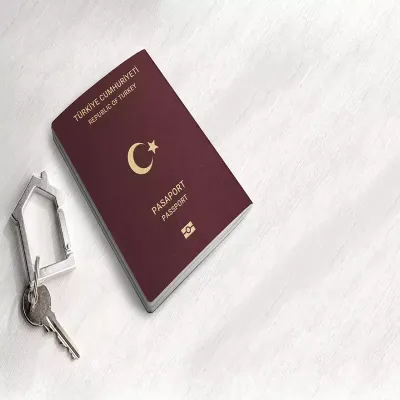Turkey’s attractive residency by buying property program has become a popular choice for foreigners seeking to relocate. This option not only provides a pathway to residency but also offers the potential for long-term investment returns. Here’s a comprehensive guide on how to obtain Turkish residency by purchasing property.
Why Choose Property Investment?
1. Booming Real Estate Market:
Turkey’s real estate market is thriving, with increasing property values, especially in cities like Istanbul, Antalya, and Bodrum.
2. Affordable Luxury:
Compared to Western countries, luxury properties in Turkey are relatively affordable.
3. High Rental Yields:
Cities such as Istanbul offer high rental yields, making property investment financially attractive.
4. Citizenship Pathway:
Buying property worth at least $400,000 can also lead to Turkish citizenship.
Eligibility Criteria
To qualify for Turkish residency by buying property, you must:
• Purchase property worth at least $75,000 in metropolitan areas or $50,000 in other areas.
• Hold the property for a minimum of three years.
Step-by-Step Process
1. Property Selection:
Choose a property that meets the investment threshold. Consider factors such as location, property type, and potential for appreciation.
2. Legal Assistance:
Engage with a reputable real estate agent and legal advisor to ensure all legal requirements are met.
3. Purchase Agreement:
Sign a purchase agreement and ensure it is notarized.
4. Property Registration:
Register the property in your name at the local Land Registry Office.
5. Obtain Title Deed (Tapu):
Ensure the title deed is officially registered in your name.
Application for Residency
Once you have purchased the property, follow these steps to apply for residency:
1. Online Application:
Complete the residence permit application form on the Directorate General of Migration Management (DGMM) website.
2. Document Submission:
Gather and submit the required documents, including:
- Valid passport
- Proof of property ownership (title deed)
- Completed application form
- Proof of financial stability
- Health insurance
- photographs
3. Schedule Appointment:
Book an appointment at the nearest DGMM office to submit your documents and complete the application process.
4. Biometrics:
Provide biometric data, including fingerprints and photographs.
5. Fee Payment:
Pay the applicable residence permit fee.
6. Approval:
Await approval and receive your residence permit card.
Benefits of Property-Based Residency
1. Path to Citizenship:
Owning property worth at least $400,000 can also make you eligible for Turkish citizenship.
2. Investment Returns:
With a booming real estate market, your property investment is likely to appreciate over time.
3. Lifestyle Advantages:
Enjoy Turkey’s rich cultural heritage, pleasant climate, and high quality of life.
4. Visa-Free Travel:
Turkish residents can travel visa-free to many countries.
Long-Term Residency
After holding a residence permit for eight years, you may be eligible to apply for long-term residency, which grants indefinite stay rights.
Requirements:
• Proof of continuous residence for eight years
• Proof of finaPopular Invncial stability
• Health insurance
• Social security contributions (if applicable)
Popular Investment Locations
1. Istanbul:
As the cultural and economic hub of Turkey, Istanbul offers high rental yields and significant property appreciation potential.
2. Antalya:
Known for its stunning beaches and tourism, Antalya is ideal for holiday homes and rental properties.
3. Bodrum:
A popular destination for luxury villas and holiday homes, with a vibrant expat community.
4. Ankara:
The capital city offers steady growth and investment potential in residential and commercial properties.
Tax Considerations
1. No Inheritance Tax:
Turkey does not impose inheritance tax on foreign property owners.
2. Double Taxation Agreements:
Turkey has agreements with many countries to avoid double taxation, benefiting investors with international income.
Challenges and Considerations
1. Legal Complexities:
Navigating Turkish property laws can be complex; it’s essential to work with experienced legal professionals.
2. Market Fluctuations:
Real estate prices can fluctuate; conducting thorough research and seeking professional advice is crucial.
3. Language Barrier:
While many professionals speak English, learning some Turkish can be beneficial for smoother transactions.
Conclusion
Obtaining Turkish residency by buying property is a viable and attractive option for foreign investors. With its relatively low investment threshold, thriving real estate market, and the potential for citizenship, this pathway offers numerous benefits. Whether for personal use, rental income, or long-term investment, Turkish real estate presents a compelling opportunity. By following the outlined steps and understanding the requirements, you can successfully navigate the process and enjoy the many advantages of living in Turkey.




















